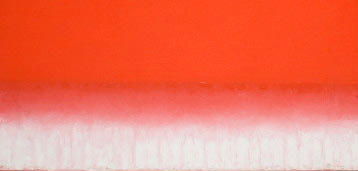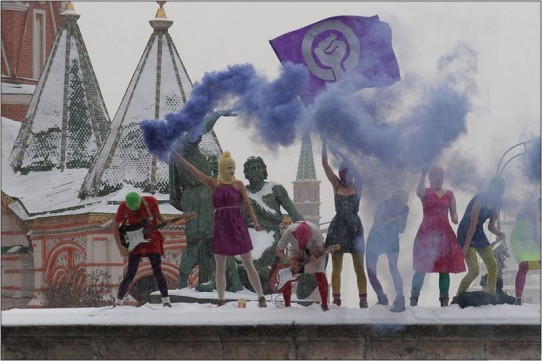Censorship, Democracy, Gender. Feminist critiques and resistances
Zachęta – National Gallery of Art
free entry
Heinrich Böll Foundation and Zachęta – the National Gallery of Art are pleased to invite you to take part in the international conference Censorship, Democracy and Gender. Feminist Critiques and Resistances
In democratic societies censorship tends to be a difficult issue. On one hand – it is presumed that within liberal political systems all forms of restrictions of artistic expression have already been overcome or that they can be perceived as incidents within a generally free field of cultural production. On the other – there is a tendency to show, that the very organization of the contemporary Western societies, its governance and biopolitics, provide multiple forms of censorship, of which the famous “cases” are just symptoms. The critical perspective allows to skip generalizations and provide tools for theory and practice involved in social change. Feminist critical perspective provides an emphasis on gender and sexuality topics as most often present in the daily practice of censorship cases.
The research of scholars worldwide, including Lisa Duggan and Nan Hunter, Judith Butler, Pierre Bourdieu, Robert Atkins and Svetlana Mintcheva, to name just a few authors who have been publishing on this topic show that censorship might be a regular element of the daily lives of contemporary democratic societies. Within democratic politics it takes form of economic organization of the artistic production; battles over sexual explicitness or gender politics; pornography and child abuse.
While analyzing the current cases of censorship within cultural production we noticed a specific tendency of connecting the economic restrictions and sexuality/gender issues. The cases of Dorota Nieznalska (Polish artist, who, after 8 years of criminal case on the basis of the article 196 of Polish Penal Code – offense of the religious feelings, was declared innocent in 2009), Ulla Karttunen (Finnish feminist artist who was sentenced for her art work criticizing internet teen porn market; the judge resigned from acting upon the sentence) and recently – the Pussy Riot feminist group from Russia, are all connected as these, where the sexual politics intersects with economic and legal norms. They all have been sentenced for their sexual explicitness, yet – it would be difficult not to see their institutional, legal and economic objectives.
We would like to propose a conference, during which – while discussing these particular cases and more, we would provide a feminist analysis of contemporary forms of censorship which would embrace its economic, legal and religious elements. We decided to invite scholars working in the social and cultural studies, artists and curators from the US, Britain and our region – Sweden, Russia, Poland, Ukraine, Belarus, Germany, Czech Republic, Slovakia and Finland, to discuss various forms and definitions of contemporary censorship and its connections and intersections with politics, gender and economy. We would like to discuss the contemporary forms of censorship with the emphasis on gender, economy and sexuality issues, starting with some examples from Poland and the region.
We would also like to speak about theory, media and art in the context of censorship. We hope that this conference will allow to add to both – theory and practice of critical approaches to contemporary censorship and cultural production. We want to put a special emphasis on the feminist culture jamming and guerilla strategies as forms of censored art, we would like to talk about the protection of religious feelings and the protection of children and we would like to close the conference with an interdisciplinary discussion on strategies to resist censorship. We proposed to prof. Lisa Duggan to open our conference with a key note lecture, which will highlight the problem of censorship as central element of the neoliberal governance.
Invited guests of the conference includes journalists, theorists, activists and artists whose work is connected to censorship.
Guest speakers:
prof. Lisa Duggan, New York University, USA (confirmed)
Anda Rottenberg, art theorist, former director of Zacheta – the National Gallery of Art (tbc)
Panelists:
Sylwia Chutnik, writer, Warsaw, Poland; dr Alek Epstein, art theorist, Russia / Israel; Anna Grodzka, MP, Poland ; Anna Viola Hallberg, artist; Sweden; Zuzanna Janin, artist, Warsaw, Poland; Dorota Jarecka, art journalist, Warsaw, Poland; Ulla Karttunen, feminist artist, Finland; dr Tomek Kitliński, artist, philosopher and curator, University of Maria Sklodowska-Curie, Lublin ; Dr Lauren Kaminsky - Clinical Assistant Professor at New York University's Gallatin School of Individualized Study; dr hab. Jacek Kochanowski, sociologist, queer and gender studies, Warsaw, Poland; prof. Izabela Kowalczyk, feminist art critic, theorist and curator, Poznan, Poland; Roman Kurkiewicz, journalist, Warsaw, Poland; prof. Paweł Leszkowicz, art theorist and curator, Institute of the History of Art, Adam Mickiewicz University, Poznan; Lidia Makowska, cultural activist, curator and theorist, Gdansk, Poland; Dorota Nieznalska, artist, Gdansk, Poland; Roman Pawłowski, art journalist, Poland; Aleksandra Polisiewicz, artists, Poland; Jacek Poniedziałek, actor, publicist, Theater TR Warsaw ; Anne Roth, a journalist, feminist, Berlin, Germany ; Anda Rottenberg – art curator and critic, Warsaw, Poland; Katarina Samucewicz, Pussy Riot, Russia (confirmed – via skype) ; Katya Shadkovska, artist, Russia; Zuzana Štefková – feminist art theorist and curator, Prague, Czech Rep.; Kuba Szreder, art curator and theorist, Loughborough University, England ; Nataliya Tchermalykh, feminist activist, art curator, Ukraine; dr Tamara Zlobina, philosopher, art theorist, Ukraine ; dr Katarzyna Bojarska, litarary theorist, art critique, polish Academy of Science( IBL PAN), Warsaw ; Dr Adam Ostolski – Dr. Adam Ostolski, sociologist, University of Warsaw, co-president of the Polish Green Party.
The project of the conference follows several years of research and activism of the Indeks73 Anticensorship Network (www.indeks73.pl) and a conference in the Zachęta Art Gallery in Warsaw in February 2012. The name Indeks73 was inspired by the article 73 of Polish Constitution, which grants the liberty of artistic and academic research and publication and the right to participate in cultural production to everyone. The Network was active between 2008 and 2011, currently some of its members, in cooperation decided to organize a conference about the feminist approach and theories of censorship in cooperation with the Heinrich Böll Foundation Warsaw Office.
About the organisers:
dr Ewa Majewska – is a feminist scholar at the Gender Studies at the University of Warsaw and the Cultural Studies in the Jagiellonian University in Cracow. She has been a member of the Indeks73 Network since its beginnings. She published in Signs, the Transverse Journal (an article on censorship: http://groups.chass.utoronto.ca/complitstudents/transverse/current_issue.html) Przegląd Filozoficzno-Literacki, Nowa Krytyka, Bez Dogmatu, Le Monde Diplomatique (pl edition) and many others. She is the author of Feminism as social philosophy. Essays on Family (2009, in Polish) and several coedited books on art, culture and society. She co-edited the www.indeks73.pl website.
Agnieszka Grzybek – feminist activist, a coordinator of the Gender Democracy program in the Heinrich Böll Foundation in Poland (http://www.pl.boell.org/web/96.html). She has been the translator of the main UN documents concerning gender and Feminine Mystique by Betty Friedan into Polish, coordinator of several feminist campaigns of key importance and the director of the main feminist foundation in Poland, OSKA Foundation. She co-authored several books concerning gender and democracy and the human rights for women.


